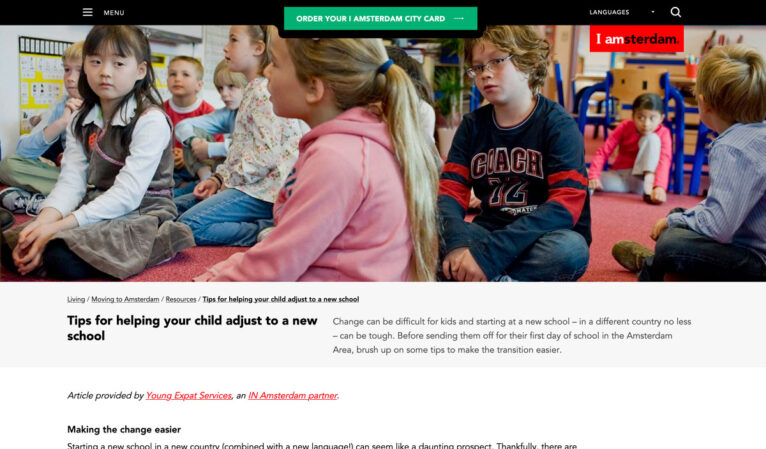Making the change easier
Starting a new school in a new country (combined with a new language!) can seem like a daunting prospect. Thankfully, there are many things you can do to give your child a head start in adjusting to the changes and understanding the Dutch school system.
Gather information ahead of time
Try to speak with your child’s teacher before they start school so you can gather helpful information and help them prepare. Knowing what to expect will prevent unwelcome surprises, too.
- Ask about the school’s plan to help international students adjust.
- Find out how a typical day is structured and explain it to your child, as knowing what to expect makes things easier.
- Enquire about rules for using the toilet.
- See if your kid needs to bring a snack and/or lunch. If they do, consider taking them to buy a new lunchbox at Hema, Blokker or another store to get them excited.
- Check and see if they have physical education classes and whether they need to bring anything special, like shoes or sweatpants.
- Research how drop-off and pick-up works. Can you come into the classroom, or do you have to wait outside? If you need to meet your child somewhere, show them where they need to go in advance.
Help your child socialise
Meeting people and making friends is a big part of adapting to a new school. Once they have a few buddies, they’ll start feeling at home, so take some steps to help with socialising.
- Try to arrange some play dates and meetups for your child. They can be a great way to start learning Dutch and will give them something to look forward to.
- Invite other kids to your home, but remember that in the Netherlands, other parents typically don’t join play dates.
- Take your child to a local playground and encourage them to interact with other kids while you chat with fellow mums and dads. You’ll find Dutch people are usually easy to speak with, especially if you tell them you’re new here.
- Find after school activities by Googling “naschoolse activiteiten” and adding the area where you live, or check www.kidsproof.nl for fun ways to meet other children and practise Dutch.
Making life easier at home
Helping your child adjust to a new school doesn’t stop when they leave the classroom, but there are many things you can do at home to ease the process along for you and them.
- Establish a routine at home (for instance, determine a bedtime and stick to it) to give your child the stability of a schedule.
- If your child is homesick for the place you used to live, discuss this with them. Explain that you understand and that this phase will pass.
- Getting used to a new school can be tiring, so remember that your child might seem worn out. Try to make sure they get enough sleep every night; Dutch kids between the ages of three and eight usually go to bed around 19:30.
- Encourage your child to communicate openly, express themselves and share their feelings. Just talking with others can help relieve stress.
- Remind yourself that your child is going through a big change and adapting can be hard. This period can be tough on parents as well, so go easy on yourself, too.
- Take a deep breath and trust that everything will work out. Adjusting to a new environment takes time and can’t be rushed. Pressuring yourself (or your child) won’t make it happen any quicker.
Put on a brave face
When you’re new in the Netherlands, try to be confident around your child. Moving to a different country can be intimidating (and a little scary), but if you’re brave and positive, chances are they will follow your lead. Learning Dutch can also make things easier – and it’s fun – so look into lessons and try to practise with your family.
If you’d like to learn more about helping your family adjust to life in the Netherlands, Young Expat Services offers practical advice, resources and support to get you started.
For further food for thought, learn more about the Dutch education system and the options available in the Amsterdam Area.



